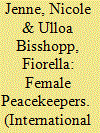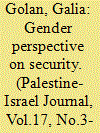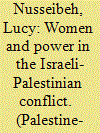|
|
|
Sort Order |
|
|
|
Items / Page
|
|
|
|
|
|
|
| Srl | Item |
| 1 |
ID:
177852


|
|
|
|
|
| Summary/Abstract |
In 2000, the United Nations Security Council Resolution 1325 on Women, Peace and Security recognized an urgent need to mainstream a gender perspective into peacekeeping operations in order to achieve gender equality. UN member states have been called upon to implement the Resolution through National Action Plans. Almost two decades after its adoption, research indicates that progress towards the goals set in Resolution 1325 has been slow. This article builds on the case of the Chilean military to assess whether and to what extent a gender perspective has been incorporated into the country’s peacekeeping practice. We argue that gender stereotypes have persisted despite Chile’s status as a regional pioneer in promoting gender equality in its defence policy. Paradoxically, the new opportunities peacekeeping offered for women in the military have been legitimized by a discourse that conforms to traditional gender stereotypes, such that women serve as the ‘peaceful and friendly face’ in peacekeeping.
|
|
|
|
|
|
|
|
|
|
|
|
|
|
|
|
| 2 |
ID:
130501


|
|
|
|
|
| Publication |
2011.
|
| Summary/Abstract |
The Van Leer Program on Women in Public Life recently held a discussion on gender perspectives on issues in the Israeli-Palestinian conflict. Women dealt with the core issues of the conflict, namely borders, settlements, refugees, etc. in an attempt to determine if a gender perspective would add or otherwise change the negotiators' approach to these issues. This was not the often-held discussion on women and peace or whether or not women are more peace-loving than men, but rather an effort to see if a look at the issues through a different lens might produce a different approach or suggest something not noticed before. One of these issues is that of security arrangements - an area generally perceived to be the exclusive domain of former military or security figures, most of whom are male.
|
|
|
|
|
|
|
|
|
|
|
|
|
|
|
|
| 3 |
ID:
094312


|
|
|
| 4 |
ID:
130502


|
|
|
|
|
| Publication |
2011.
|
| Summary/Abstract |
Women need to take their power, reconnect on issues of real concern about the future of the region, for both men and women, and take the lead in reframing the approach to security. The situation here is undeniably stuck. It is also unsustainable, and a secure, peaceful and prosperous future for Palestinians and Israelis seems not only highly improbable but also a vision that eludes the imagination. What is more, women seem to be becoming less rather than more visible in the search for this future. Wars begin in the minds of men - so therefore does peace, and so do all our possible futures, stable or unstable, violent or without violence. Peace and wars also therefore begin in the minds of women, so, as women, we need to start to think about the future we would like, and about what power we have to actually make a difference, and how we are going to use that power to bring about a sustainable and prosperous peace. There is clearly a need for new mindsets, for more ideas and creativity. The involvement of women in both formal and informal peace discussion is one of the few ways that traditional mindsets, such as those focused on fear and military security, that are such a major part of the problem, can be transformed. If women are included at all levels of peace talks, and there is a truly gendered approach - with equal representation and respect for the concerns of all members of society - perhaps we could at least be on our way to a sustainable future. We need to start by working with our minds and our creativity, and from our perspective as women. We need to imagine and consider the different options for the future, even if these are all difficult and no longer very desirable, given the compromises that must be involved, and we must insist that our points of view and ideas be heard and acted upon.
|
|
|
|
|
|
|
|
|
|
|
|
|
|
|
|
|
|
|
|
|